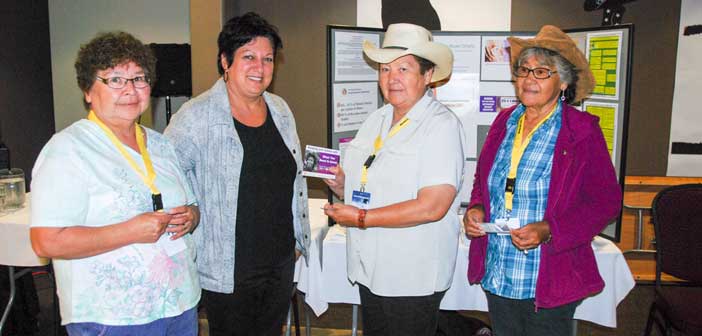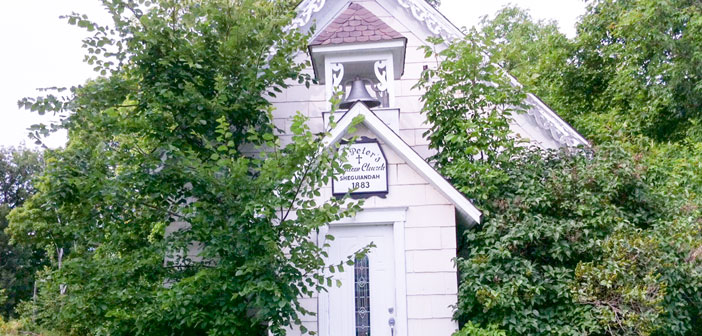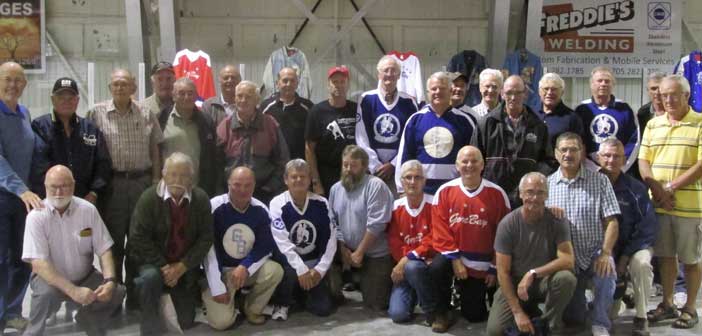LITTLE CURRENT—The annual Soaring Through The Years Elders’ Symposium, a day of pampering, education and fun and laughter, was once again offered by Mnaamodzawin Health Services and was by all accounts a major success, complete with a country and western theme.
Stan Wesley, a professional speaker of Cree heritage, now based in Toronto, was the master of ceremonies for the day-long event and had the elders and organizers alike engaged and all smiles throughout the day.
Mr. Wesley, adorned in a cowboy hat to set the tone for the day’s theme, began the morning by thanking the elders for “clearing the way through the bush” and for soaring through the years so those in the next generation can continue to soar after them.
“This is a day for you to relax, learn and be pampered,” he added.
Deputy Grand Chief of the Anishnaabek Nation, Glen Hare, was also on hand and gave an address to the full house in the Ojibwe language. Switching over to English for the minority who were English speakers only, Deputy Chief Hare thanked Mnaamodzawin for inviting him to the symposium, noting Mr. Wesley’s good works and his talent at making people laugh.
The chief recounted the tale of his 16-year-old self quitting school to go to work. It was thanks to a group of elders who kept him focused and saw his potential that he got to where he is today, he said. Many of those people have since passed on, he said, but he is forever indebted to them. “The elders were my teachers, my guides,” he said.
The deputy grand chief said he recently had a conversation with a woman who was concerned about the language being lost by First Nations’ youth and suggested that fluent elders be placed in all First Nations classrooms to help remedy this situation.
He shared that his mother is a resident in the Manitoulin Lodge and that when he goes to visit, and she is spoken to in her Ojibwe, she comes alive and chats with her son. But as soon as he leaves she once again shuts down, isolated by language.
[pullquote]“We often think of exercise in terms of heart health, but it is also important in terms of brain health,” Dr. Nylen began. “And it’s never too late or too early to get started.”[/pullquote]
The keynote speaker at the event was Dr. Kirk Nylen, director of outreach at the Ontario Brain Institute, discussing the benefits of physical activity in preventing and managing Alzheimer’s disease, as well as other brain disorders.
“We often think of exercise in terms of heart health, but it is also important in terms of brain health,” Dr. Nylen began. “And it’s never too late or too early to get started.”
Last year, he explained, the Ontario Brain Institute made headlines when it came out with a study, which combined the research of 800 studies that looked at the benefit of physical activity on Alzheimer’s disease.
While it may be a small organ, weighing in at three pounds, the brain uses the most cells, the most blood and the most oxygen, he said. “And the brain is dynamic, changing all the time, but it ages like the rest of us and brains can get sick too.”
He shared that there are over 200 brain disorders including stroke, depression, migraines and epilepsy. He asked the audience to raise their hand if they have not been affected, either directly or indirectly, by one of these. Not one hand was raised.
Dr. Nylen explained that dementia is a term to describe brain cells dying more quickly than they should, causing a loss in memory. “Losing your car keys is not a problem, but forgetting how to drive is,” he said.
Alzheimer’s is a form of dementia where the number one risks of getting the disease are aging and genetics. Cholesterol, diabetes, high blood pressure and obesity are the next risks in line. By 2038 over one million Canadians will have dementia, it is predicted. The yearly cost to Canadians is $15 billion but is expected to grow tenfold to $153 billion within a generation. The time spent providing informal care to those with dementia is also expected to rise from 231 million hours to 756 million hours.
While there are a few drugs on the market that can delay the decline of memory loss, they are very ineffective, the doctor explained. Vitamin E can help protect brain cells, but this also has a limited effectiveness.
An elder asked about the drugs and when they are prescribed. Dr. Nylen responded that the sooner the diagnosis the better, but the drugs really only delay the process by one year.
“There are five things we can do to take charge,” he said, “sleep, keep stress levels low, diet, brain training (not just crosswords and sudoku, but learning new things all the time) and physical activity.”
Physical activity can reduce the chances of getting Alzheimer’s by 38 percent, or one in seven people. Those who already have Alzheimer’s report feeling less depressed and enjoying a higher quality of life.
Dr. Nylen recommended 30 minutes a day of exercise and said the best effects are seen when having fun. “Don’t be intimidated,” he said. “Start low and go slow.”
While physical activity isn’t a cure, it’s a “terrific foundation for prevention and management of chronic diseases like Alzheimer’s.”
The symposium also included presentations from Roxanne Makela of Behaviour Support Ontario, which seeks to enhance services for older adults in Ontario with or at risk of complex and responsive behaviours that may be a result of dementia, mental health and/or substance use and other neurological disorders as well as providing enhanced caregiver support.
The elders were also treated to a special concert by none other than both Loretta Lynn and Patsy Cline, much to their delight. Clapping and swaying in time, the elders were an appreciative audience to this tribute singer’s talents.
The room at the Manitoulin Hotel and Conference Centre was lined with booths and vendors, all showcasing services offered to seniors. Special incentives were given for those who made their way to each and every booth and asked pertinent questions as to their services through a door prize.
Louise Hickey, ambassador and master trainer of Urban Poling Inc., gave a special demonstration on the art of urban poling while Kristen Taus of the Northeast Local health Integration Network spoke on navigating Ontario’s health care system as well as on the future direction of health care on Manitoulin.





